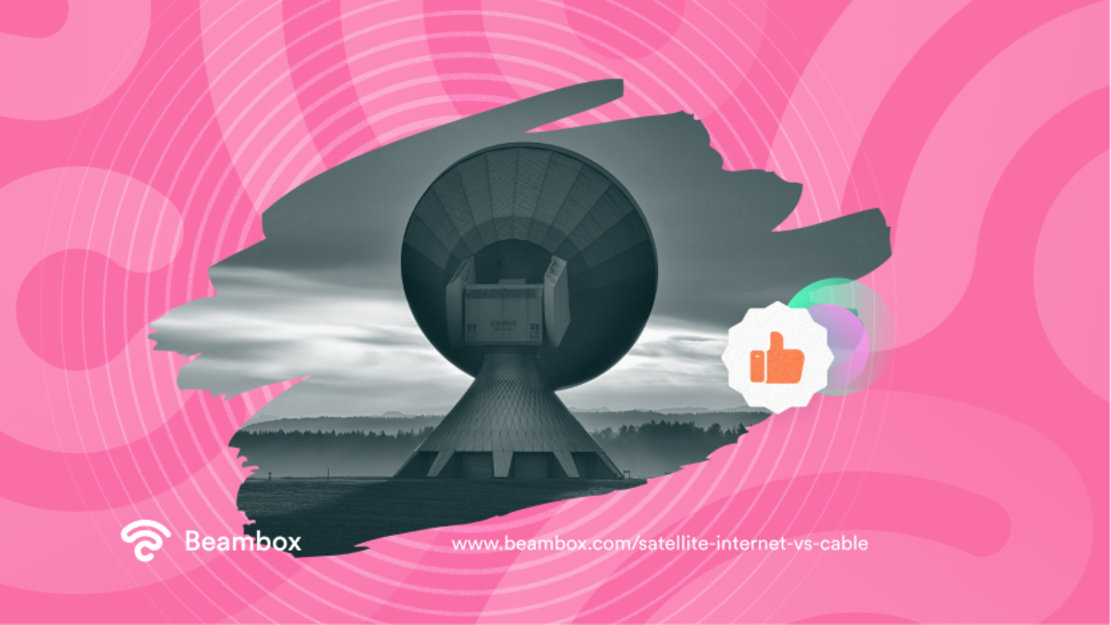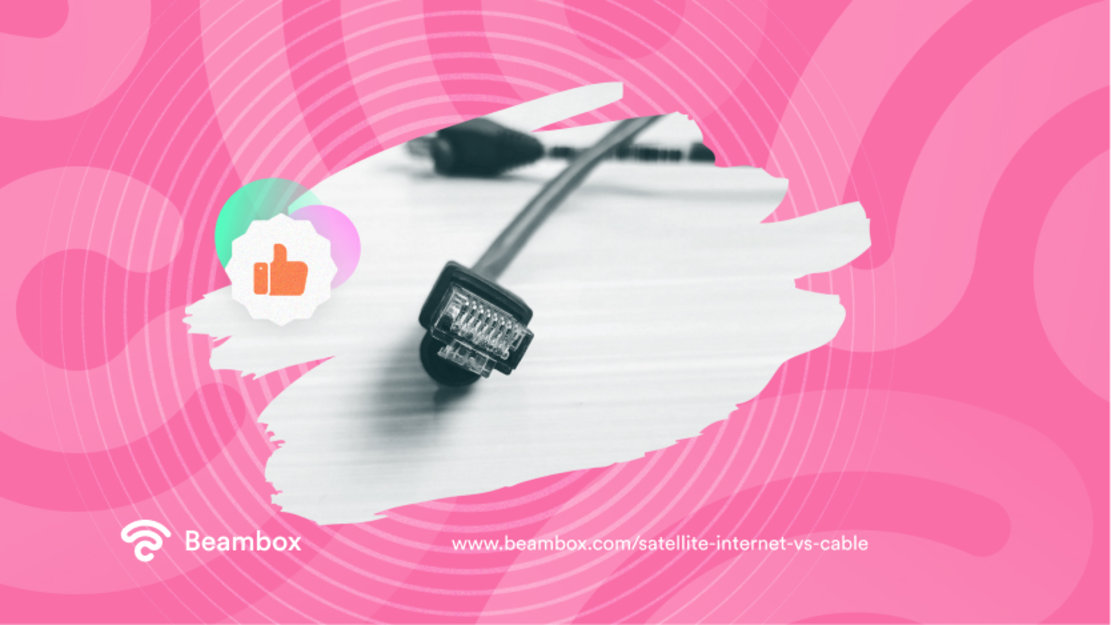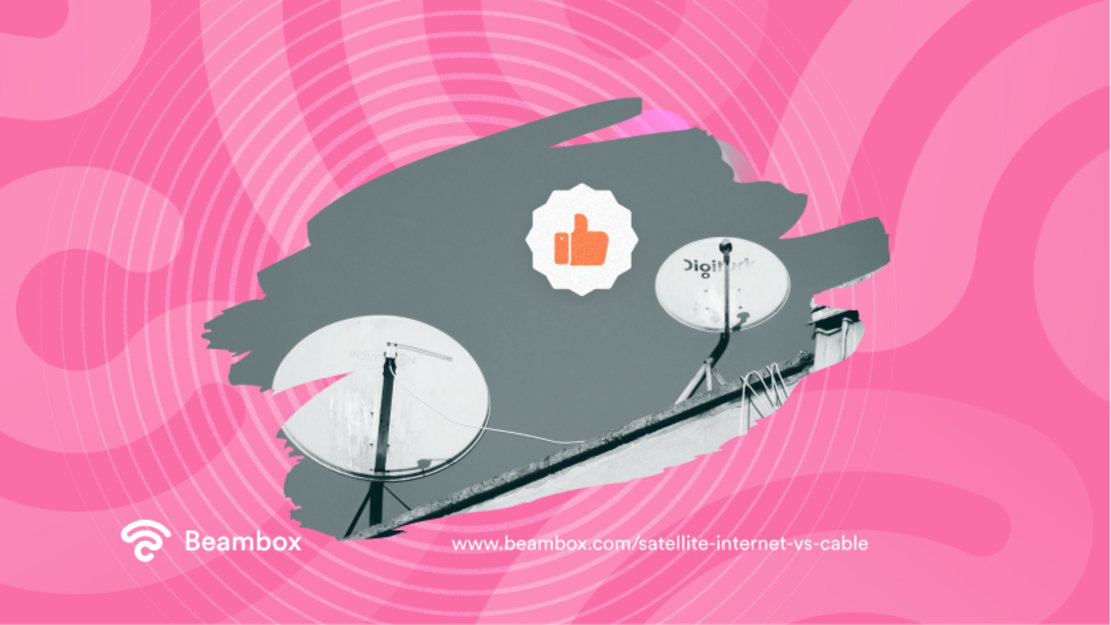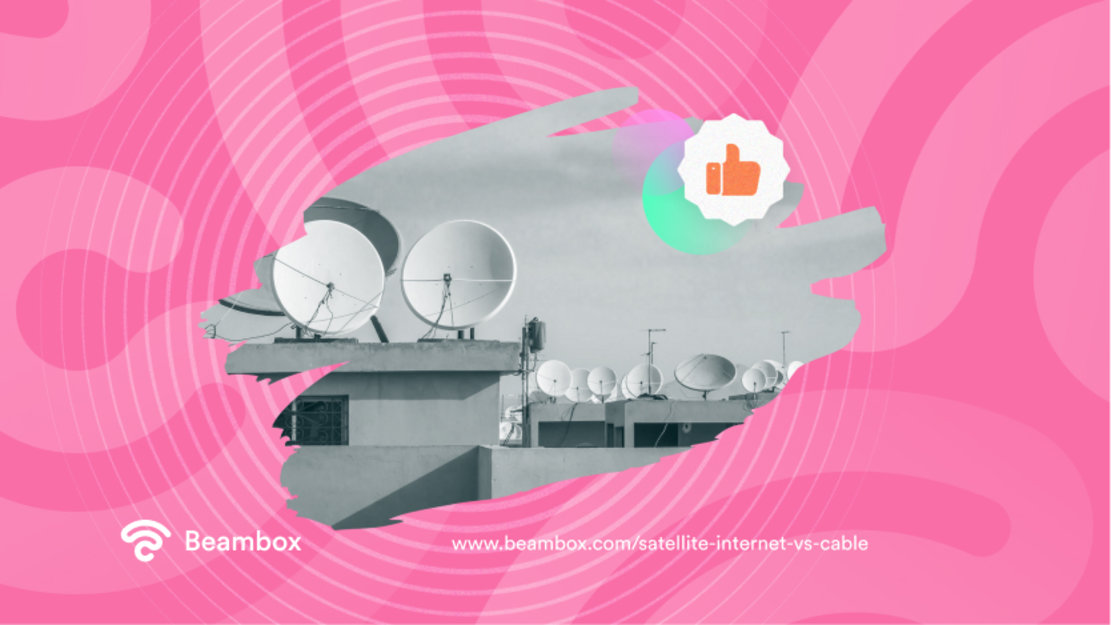Satellite Internet vs Cable: 6 Ways They Differ
Satellite Internet vs cable is a frequent comparison people make when choosing the right connection for their needs. After all, these are the two most commonly available solutions.
However, each has strengths and weaknesses. The trick is to choose the solution that best suits your specific needs.
It’s wise to research both options before making the final choice, and this is the perfect place to start. So, let’s look at both Internet solutions separately before comparing them.

What Is Satellite Internet?
Satellite Internet is an Internet connection that uses satellites in space to provide broadband Internet access to users on Earth. These satellites transmit radio signals that a dish receiver on Earth receives. However, that isn’t enough to provide you with an Internet connection.
Your devices can’t understand the data the receiver transmits and sends back to the satellite. It has to connect to a modem that translates the data into useful information. At this point, your wired computer will be able to connect to the Internet through the modem.
For devices with WiFi, you’ll also need a router that connects to the modem and distributes the satellite signal.
Back in the day, people had to invest in large dishes to use this type of Internet. This made satellite service quite expensive to implement in regular households. But now, we have smaller dishes you can mount on the roof or even take while traveling. As a result, this technology has become relatively easy to install and maintain.
But remember, you need specialized companies like Starlink, Viasat, and HughesNet to get satellite Internet as a WiFi alternative.
What Is Cable Internet?
Cable Internet is a broadband service that uses coaxial cables, like those for cable television, to provide Internet access. These cables connect to cable modems, which then connect to routers just like in satellite Internet.
Most people prefer this type of Internet connection since it provides faster speeds than phone lines. However, it isn’t as fast as ethernet cables or fiber optic connections that use light signals for data transmission.
For people wondering where to get this connection, some popular cable companies include Spectrum, Xfinity, and Mediacom.

6 Ways Satellite Internet Differs From Cable Internet
By now, you must be familiar with satellite and cable Internet basics. You must also have noticed how much they differ in terms of data transmission methods.
This makes these technologies quite different from each other. That’s why the rest of this article will discuss their differences. By the end, you can judge whether cable Internet or satellite is a better option for you. So, here are six areas where satellite Internet differs from cable Internet.
1. What Are the Data Limits for Satellite Internet vs. Cable Internet?
Cable Internet has much lower data caps than satellite Internet. A cable provider may offer up to 1 TB of data per month. However, the actual number depends on the provider, so choose carefully.
On the other hand, satellite Internet imposes stricter data limits. For example, Viasat provides 850 GB of high-speed Internet monthly, while HughesNet only offers 200 GB.
But what are data caps? Internet service providers (ISPs) often place limits on the amount of data people can use within a limited time frame.
These data caps usually only affect people with extensive connection requirements. Others might not even notice these caps.
2. Which Is Faster: Satellite Internet or Cable Internet?
When it comes to speed, cable Internet takes the winning position again. It’s much faster than satellite Internet due to its local infrastructure. Internet signals don’t have to face interference when moving through cables.
In fact, your download speeds can reach up to 1 Gbps while upload speeds remain at 50 Mbps!
On the other hand, radio waves travel through air and are more susceptible to interference. Factors like weather conditions, physical obstructions, and even network congestion can mess with the quality of a satellite connection.
As a result, users often suffer with much slower speeds. To fix this, you may need a network vulnerability scanning tool.

3. Cable Internet vs Satellite Internet in Terms of Availability
Satellite Internet only requires a direct line of sight with the sky to work. Since the sky is available everywhere, this type of Internet can provide coverage in even the most remote areas. That’s why people living in rural areas, as well as industries in far-off areas, use this technology.
However, cable Internet relies on wired infrastructure, which isn’t available in these areas. You can only access this type of Internet in areas where cable technology already exists. This makes cable Internet less available than satellite Internet.
4. Does Cable Internet Offer More Mobility Than Satellite Internet?
No, cable Internet doesn’t offer more mobility than satellite Internet. As you already know, cable Internet relies on wired connections. These are less flexible since you have to sit in one place to use these connections.
Even if you use WiFi through cable Internet, you can only move around inside the venue. You can’t take the connection outside your home or office. However, some cable providers like Xfinity do offer public or social hotspots for their customers.
Alternatively, some modern satellite mobile WiFi products are starting to be available. This makes satellite Internet a better choice for travelers and people who are constantly moving. However, this won’t be possible if you opt for older, bigger dishes.
5. Which Is More Expensive: Satellite vs Cable Internet?
Satellite Internet is typically more expensive than cable Internet. After all, the main infrastructure for cable Internet is already available in most places. All you need to do is rent or buy cable modems and routers.
Comparatively, satellite dishes are quite expensive. On top of that, you need to buy satellite modems and routers along with cables. A monthly subscription fee is also a consideration.
While you can install cable Internet equipment yourself, some people might require professional help. This adds to the cost of this technology. Still, cable Internet remains far cheaper.

6. Cable vs Satellite Internet in Terms of Reliability
Nobody likes it when their Internet connection stops working in the middle of something important. It might be an important meeting, a video call, or even just the latest movie.
You need a reliable Internet connection to do all this without any interruption. Therefore, it makes sense to compare satellite Internet with cable in terms of reliability as well.
Here, cable Internet wins again. Its robust infrastructure means it will almost always be available. Additionally, it won’t suffer much when the weather turns bad. All you have to do is maintain the cables and equipment.
However, power outages definitely make an exception. You need constant power to use a cable connection, so that’s the only time when it won’t be reliable.
On the other hand, satellite Internet is more susceptible to bad weather. It might even stop working with light winds. Moreover, the distance between the Earth and the satellite introduces latency. This lag makes satellite Internet less reliable.
Regarding power outages, most modern satellite dishes work on batteries to make them portable. If this is the device you’re using, you won’t have to worry about power outages.

Satellite Internet vs Cable: Which Is Better for You?
At this point, you must be familiar with the areas where these two technologies differ. But how do you choose between satellite Internet vs cable? It all boils down to your specific needs. So, let’s start by discussing the situations where satellite Internet works better.
The only options in remote areas are satellite Internet, a Digital Subscriber Line (DSL,) or dial-up Internet. Out of all three, satellite Internet is the fastest. Therefore, it’s the most viable solution for such areas.
Apart from remote homes, maritime and aviation industries also use satellite Internet for the same reason.
Travelers also prefer satellite Internet since it’s available almost everywhere. However, this choice means sacrificing speed, reliability, and data caps. If you don’t want to make these sacrifices, go for cable Internet, especially if your area already has cable infrastructure.

Make the Right Choice for Your Internet Needs
Choosing between satellite Internet vs cable is challenging. Satellite Internet is best for people living in rural or remote areas. However, you might suffer in terms of reliability, speed, and latency.
On the other hand, cable Internet is more reliable, faster, and cheaper than satellite Internet, but it is not always available.
If you run a business and want to increase the security of your connection, try Beambox. It is a WiFi marketing platform that helps you scale and make internet security easy. With Beambox, you can create multiple separate networks while simplifying authentication and bandwidth management. Try Beambox today!

Frequently Asked Questions About Satellite Internet vs Cable Internet
Choosing an Internet connection is a huge investment. You must have all the information you need to make the right decision. So, let’s answer some frequently asked questions before wrapping things up.
What is the difference between satellite Internet and cable Internet?
Satellite and cable Internet differ in delivery methods, speed, and reliability. Satellite Internet uses satellites for remote access but has higher latency and weather sensitivity.
On the other hand, cable Internet relies on wired connections. This way, it offers lower latency and faster speeds but lacks availability due to cable infrastructure.
What is the biggest disadvantage of using satellite Internet?
The biggest disadvantage of using satellite Internet is its high latency. As a result, data transmission delays occur, especially during activities like video calls and online gaming.
Additionally, weather conditions can disrupt the signal. Slower speeds and less reliable connections are typical after bad weather.
Does satellite Internet need a cable?
Yes, satellite Internet needs a cable, but it only connects the devices together. In cable Internet, the wires are the main source of data transmission.
On the other hand, satellite Internet relies on radio waves for data transmission. However, you must still connect multiple devices, such as satellite dishes and WiFi routers.



